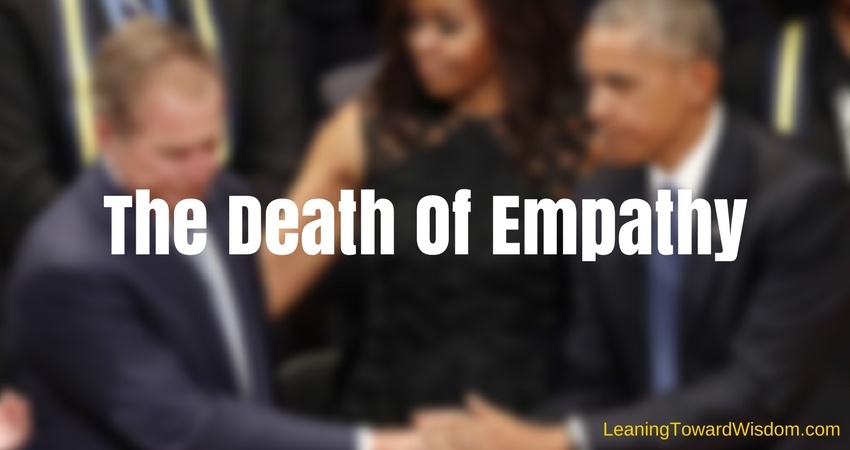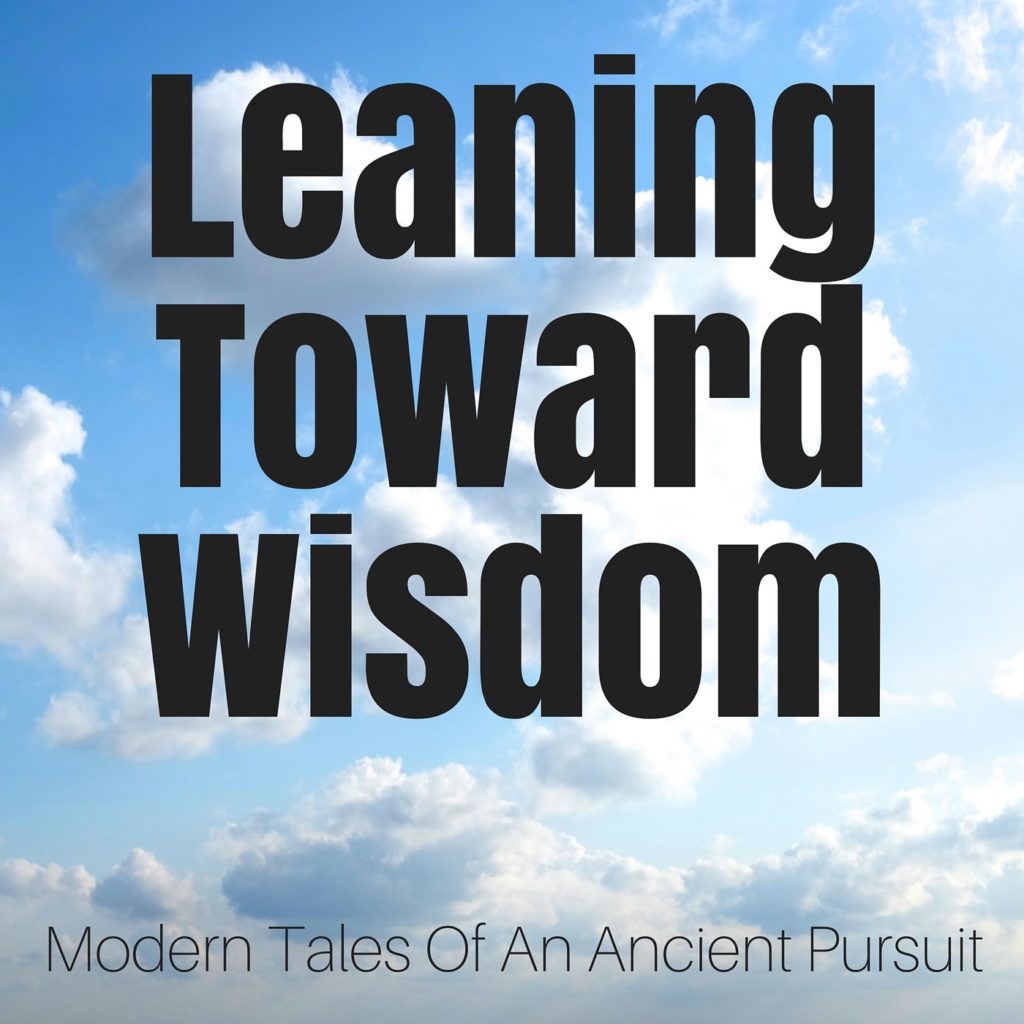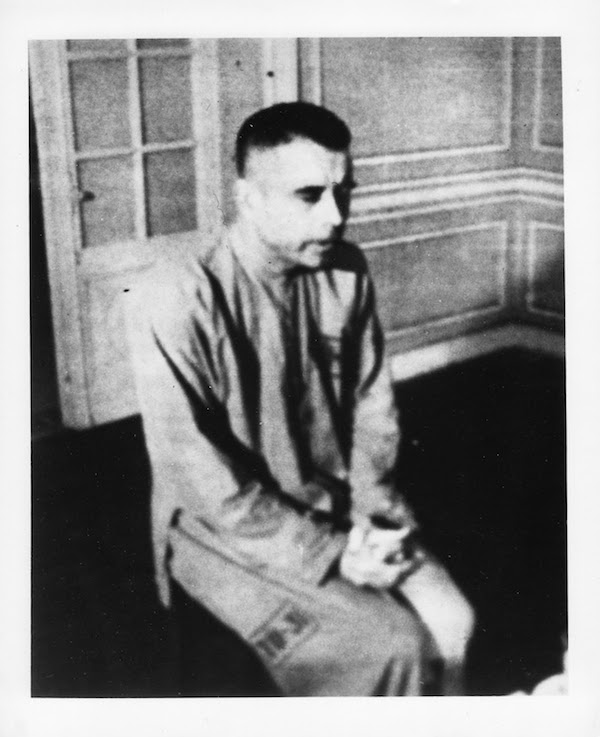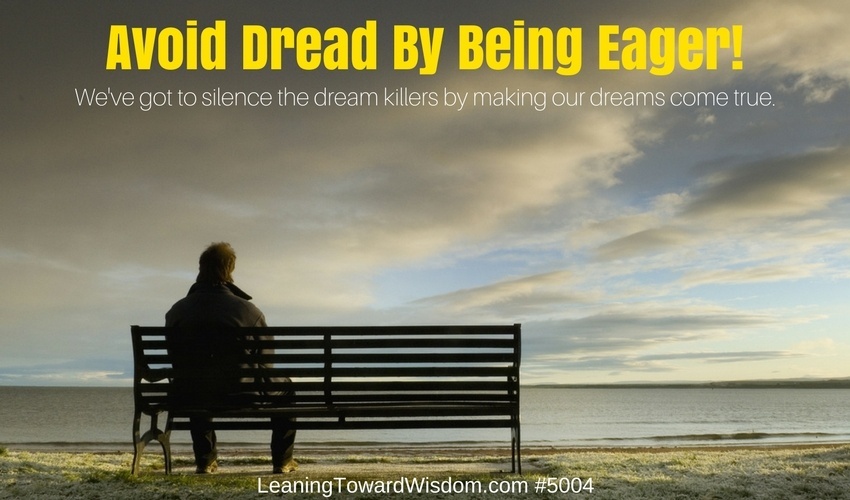The Death Of Empathy – 5007
Podcast: Play in new window | Download (Duration: 46:03 — 42.3MB)
Subscribe: Apple Podcasts | Spotify | Email | RSS | More

On April 21, 2018 former first lady Barbara Bush was laid to rest. She was 92, the wife of our 41st President and the mother of our 43rd. Two former Presidents, Barbara’s son, George W. and Obama shook hands with the clear aim being the consolation at the death of a mom. The photo dispells the very title of today’s show – the death of empathy. But not really.
Empathy, as a widespread, viral-like experience may not be dead, but she’s on life-support. Greater Good Magazine, produced by the University of California at Berkley, defines empathy like this…
The term “empathy” is used to describe a wide range of experiences. Emotion researchers generally define empathy as the ability to sense other people’s emotions, coupled with the ability to imagine what someone else might be thinking or feeling.
Contemporary researchers often differentiate between two types of empathy: “Affective empathy” refers to the sensations and feelings we get in response to others’ emotions; this can include mirroring what that person is feeling, or just feeling stressed when we detect another’s fear or anxiety. “Cognitive empathy,” sometimes called “perspective taking,” refers to our ability to identify and understand other peoples’ emotions. Studies suggest that people with autism spectrum disorders have a hard time empathizing.
Empathy seems to have deep roots in our brains and bodies, and in our evolutionary history. Elementary forms of empathy have been observed in our primate relatives, in dogs, and even in rats. Empathy has been associated with two different pathways in the brain, and scientists have speculated that some aspects of empathy can be traced to mirror neurons, cells in the brain that fire when we observe someone else perform an action in much the same way that they would fire if we performed that action ourselves. Research has also uncovered evidence of a genetic basis to empathy, though studies suggest that people can enhance (or restrict) their natural empathic abilities.
Having empathy doesn’t necessarily mean we’ll want to help someone in need, though it’s often a vital first step toward compassionate action.
Psychology Today tells us 6 things about empathy that may help our conversation.
Empathy and sympathy aren’t synonymous. According to them we feel sympathy for others when we identify with their situation. But that feeling – sympathy – doesn’t necessarily connect us to that person or what they’re feeling. Proven by the fact that we can be sympathetic to somebody’s situation and have no idea about their feelings or thoughts. Sympathy rarely urges us to take action – except for writing checks to make donations. Sympathy, according to Psychology Today, doesn’t build a connection. Empathy does. As they write, “Sympathy is feeling for someone; empathy involves feeling with them.”
Empathy isn’t intuition. Research has shown that it’s both unconscious and it’s also supported by what’s going on in our brain. Neuroscience reveals that when we see others in pain it activates the parts of our brain that register pain. It appears that empathy is feeling, brain chemistry and physiology. Much of it stems from our ability, or lack of ability, to employ systematic thinking to read others.
Empathy engages specific neural circuitry in our brain. Our ability to mimic and mirror others is a capacity that takes place in specific areas of the brain.
Empathy is learned. The capacity for it is in us, but we learn it. All of us who have raised kids know that little kids have a difficult time regulating their emotions. Infants learn from the adults who surround them. Identifying with them helps kids learn to regulate their emotions. Being swept up in somebody else’s emotions isn’t empathy, by the way.
The capacity for empathy varies by individual. Today we hear a phrase that’s reasonably new to our vernacular, emotional intelligence. Sometimes you’ll hear it referred as EQ. It’s our ability to know what we’re feeling, to distinguish it from other emotions and to our emotions to better inform our thinking. Our EQ can make it harder or easier to be empathetic. Clearly, the more connected we are with our own emotions, the greater it seems our capacity to feel for others. But it’s also about our connectivity with others, not just ourselves. People who are isolated and loners may be less likely to display empathy than those who are well connected socially.
Empathy might be about more than just the individual. Some researchers have found that empathy depends on “what others are willing or able to tell about themselves.” In other words, the person for whom we feel empathy is as important as we are, the person feeling empathy.
In a study of Dutch school children, they found that kids were more empathetic when reminded by a teacher to “be a good classmate,” but that empathy declined when it came to choosing sides for a game. Friends who were chosen last and were upset about it were comforted; mere classmates who felt this way were labeled “crybabies.” Social convention and contexts play a role in how empathic a person is in a given situation, regardless of the individual capacity for empathy.
Hopefully, that provides you with a bit of insight and more food for thought about empathy. I confess it’s a deep subject filled with nuances that I don’t claim to fully understand. Truth is, I’m just knowledgeable enough to be dangerous about how it works, but I’m plenty smart enough to know the power of empathy. And I’m a lifelong practitioner.
Just here let me interject a thought or two about something that’s congruent with empathy. Observation. Presence.
By observation, I mean paying attention. Noticing things. Noticing people. I used to think this was universal. I’ve learned it’s not. And yes, I’m empathetic to people who don’t easily and naturally notice things. I’ve no idea how to help anybody improve it necessarily, but I’m thankful it’s not hard for me.
I grew up hearing about elite athletes who had various physical skills. The one skill I envied most was speed. I was quick, but I was never fast. I’m built more for comfort. 😉
The kids who could run fast fascinated me. How could they do that? I had no idea. My feet and legs just couldn’t do it.
At some point, I heard TV commentators or somebody talk about a professional athletes vision. They didn’t mean the athlete needed no glasses. They mean the player could see things others couldn’t, or could see them more quickly. I grew up hearing it applied mostly to football running backs and quarterbacks. Well, I knew I had that because I knew I was a noticer. I didn’t think about it. It was just some auto-pilot thing that I never thought about really.
Later in life, in business, it became very clear that it was one of the very limited super powers I had. My retailing career started early and ended about a decade ago. Largely, my success in retailing was because I noticed things. Every little thing.
Every day I go to a local gym. It’s a national chain and it’s a large complex. This particular chain seems to enjoy moving managers around frequently. I’ve never known a manager to be in one place for more than months. This is important because I’m always curious to see what changes if any, the new replacement will make. FYI, they rarely do anything different than the last, as least as far as I can tell. But I’m just a customer, so what do I know?
Turns out. Quite a lot. For example, I’m a clean freak when it comes to a retail experience. That includes shops, restaurants, and my gym. This gym has an outside cleaning crew that comes frequently. They move the dirt around pretty well. They don’t clean much, but they approach their work with all the vigor of 15-year-old hound dog on a hot Texas summer day. At least weekly (likely much more often), I think of about what I’d do in the first hour if I were to run the place! I’d pull an all-hands-on-deck cleaning jamboree. I’m daily amazed at how little attention is paid to things that I don’t deem “details,” but things that are just basic, good business. Lately, my pet peeve is the hand sanitizer dispensers being empty. Or the paper towel dispensers being empty. Inexcusable. But that’s the noticer and the business guy in me. I can’t help it. Well, maybe I could, but I don’t want to.
Presence isn’t just being in a particular place. You may prefer words like focus or concentration. Or the phrase, paying attention. Once again, my lifelong profession of being an operator, a retailer, proves the point. Constantly I would preach and train employees to be present with each shopper. Have you ever gone up to a counter of a store, or walked into a store and been ignored? The person behind the counter isn’t helping another customer. They’re just indifferent to the fact that you’re standing there. They’re not present. That lack of presence hacks you off (it should). Again, inexcusable.
Let me pick on my gym again. You walk in, go up to the counter and type your phone number into a keypad, then put your finger on a little reader that identifies you are who you say you are. Some days – in fact, most days – there’s a friendly person who greets me. But the funny thing is when the manager and her apparent right-hand person are behind the counter, they’re engaged in conversation and they never look up at me. It’s fine. But I think about that leadership – or lack of – and wonder how long it may be before I have to find another location to visit. Of course, I’ve only been a customer for 15 years or so, so what do I matter, right?
Hopefully, you can see how these two things are congruent with empathy – observation and presence. If I’m like the manager of my gym, busy with whatever I’m busy with and immune to notice a client 3 feet away, then how empathetic am I liable to be? Not very! And if I can’t or won’t notice the client 3 feet away then how can I possibly be present with and for them? In my mind, I’ve fired this manager more times than I can count. She may be spectacular at filling out reports back to corporate. I suspect she’s really good at the stuff corporate cares about. She just sucks at observation and presence. I’m betting she lacks empathy, too. 😀
Okay, let me pull back the curtain in case you didn’t fully understand my snarkiness there. Truth is, I’m empathetic toward the manager of my gym. This woman is a mature 40-ish lady who I’m sure has competencies important to her role. But my business acumen and my empathy make me aware that she’s following leadership at the corporate level who likely measure and care about some things, while thinking other things – the stuff I’ve pointed out – aren’t quite so urgent. That’s fine, of course. They can be wrong. Because I know I’m right! 😉
I see her in her office on her computer. Quite often. Sometimes the door is closed and it’s evident she’s on her phone. I’ve been a customer for long enough to have seen this movie before. She’s on the phone with management. She’s completing reports. She’s doing what corporate wants. And in a few months, when her replacement arrives, they’ll do exactly what she’s doing. They always do. Nothing will change so far as my experience as a customer. The machine will just keep on rolling until something drastic causes leadership to implement a change. I’m always (and easily) empathetic with folks who are carrying the water of leadership, even if leadership can’t find their way out of a wet paper bag.
It’s illustrative of why empathy may be dying. Lack of understanding. Lack of tolerance for others. And I’m not talking about tolerating bad behavior or foolishness. I’m talking tolerating a gym manager who has to please a boss who may have skewed priorities. It’d be easy for me to hacked. Given my business background, I likely am more frustrated by this than the average gym member. Mostly, I feel badly for the company because I know things – their performance – could be so much better! Nothing is stopping them from being better except their own willingness to commit to it. But it’s their company and they can run it as they see fit. And that introduces another part of this that I think about…judgment.
Now before you go off thinking judgment is a bad thing consider driving your car to work. How do you determine the route you’ll take? How do you approach an intersection where the light turns yellow? What about your approach at a 4-way stop? When do you decide to get gas in your car? Do you wait until the light comes on? These are all judgments you make. You assess what’s going on and figure out how you’ll react. That’s necessary judgment.
I notice, or judge that my gym has some issues that could be easily fixed, but they’re unimportant to management. What I don’t do – again, this comes naturally easy to me – is infer that this is being done simply to make my life miserable. I don’t harshly judge the gym manager as inept. I rather doubt she is. She could easily satisfy corporate AND be a great noticer who creates a remarkable facility. And she’d likely stand out from her peers. But she’d have to deploy greater effort and concentration. She’d have to notice things she’s not necessarily rewarded by corporate to notice. She’d have to do things they clearly don’t reward. That means she’d have to be fully cooperative with corporate while being a contrarian at the same time. I realize that’s not easy. Doable, but not easy. I wish for her sake she’d find a way because I know it would make her top notch and remarkable.
I’m talking about the kind of judgment that disrupts empathy – the judging people do when others don’t do what they want them to do, or what they think they should do. That’s what happens we “should” people. “You should (fill in the blank with whatever we’d like people to do).”
Selfishness is the culprit. Roll it all up and that’s the enemy. Selfishness. We’re entirely too focused on ourselves. And what we want. Or what we think we need. As long you fit into that by giving me what I want, then I’m good. But the second you start to roll in a way not in keeping with what’s best for me, as I see it, then I’m hacked. And you’re a bad person! Me? Well, I’m a victim of your bad behavior, poor choices and unwillingness to do what I ask. So long, Empathy. It was good considering you briefly, but you’re in my way now!


How Can You Help The Podcast?
- Subscribe at iTunes | Stitcher
- Leave us a review at iTunes
- Pick your favorite way to support us financially
- Join the conversation at our Facebook group
- Tell your friends. Promote the shows on social media.
The Death Of Empathy – 5007 Read More »






